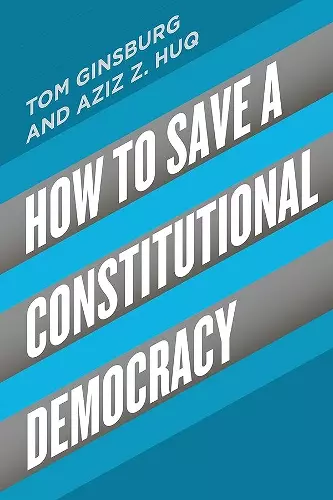How to Save a Constitutional Democracy
Tom Ginsburg author Aziz Z Huq author
Format:Paperback
Publisher:The University of Chicago Press
Published:11th Sep '20
Currently unavailable, and unfortunately no date known when it will be back

Democracies are in danger. Around the world, a rising wave of populist leaders threatens to erode the core structures of democratic self-rule. In the United States, the tenure of Donald Trump has seemed decisive turning point for many. What kind of president intimidates jurors, calls the news media the "enemy of the American people," and seeks foreign assistance investigating domestic political rivals? Whatever one thinks of President Trump, many think the Constitution will safeguard us from lasting damage. But is that assumption justified? How to Save a Constitutional Democracy mounts an urgent argument that we can no longer afford to be complacent. Drawing on a rich array of other countries' experiences with democratic backsliding, Tom Ginsburg and Aziz Z. Huq show how constitutional rules can both hinder and hasten the decline of democratic institutions. The checks and balances of the federal government, a robust civil society and media, and individual rights--such as those enshrined in the First Amendment--often fail as bulwarks against democratic decline. The sobering reality for the United States, Ginsburg and Huq contend, is that the Constitution's design makes democratic erosion more, not less, likely. Its structural rigidity has had unforeseen consequence--leaving the presidency weakly regulated and empowering the Supreme Court conjure up doctrines that ultimately facilitate rather than inhibit rights violations. Even the bright spots in the Constitution--the First Amendment, for example--may have perverse consequences in the hands of a deft communicator who can degrade the public sphere by wielding hateful language banned in many other democracies. We--and the rest of the world--can do better. The authors conclude by laying out practical steps for how laws and constitutional design can play a more positive role in managing the risk of democratic decline.
"Drawing expertly on examples from across the world, Ginsburg and Huq highlight the constitutional mechanisms by which democracies may be undermined--often by elected leaders themselves--in the contemporary era. They make a compelling case that the United States is not immune to democratic backsliding, and they point to various ways in which the US Constitution leaves us vulnerable to such backsliding. Finally, whereas other recent books on the crisis of American democracy focus on what has gone wrong, Ginsburg and Huq provide us with clear-eyed proposals--including some bold constitutional reforms--for how to fix it. I strongly recommend this book."--Steven Levitsky, coauthor of How Democracies Die "This book makes a huge contribution to our understanding of how democracies erode and what institutional reforms would make it harder for authoritarian populists to entrench their power. It should be required reading for anybody who seeks to bolster the stability of embattled democracies around the world."--Yascha Mounk, author of The People vs. Democracy "This is an important book--probably the most impressive marshaling of comparative literatures I have seen on this crucial set of issues. Using a wide range of examples, Ginsburg and Huq show how healthy democracies can mutate into autocratic or oligarchic systems, and they offer an incisive account of how this might happen in the United States. A cautionary tale told with case studies from around the world, this is a sobering analysis of our trying times." --Jack M. Balkin, Yale Law School "Awe inspiring. How to Save a Constitutional Democracy is masterfully informed, crystal clear, and exceptionally sober. I learned an enormous amount."--Adam Przeworski, New York University "How to Save a Constitutional Democracy explores the extraordinary challenges democracies face from populist leaders today, above all in the United States. It suggests that our institutions may not be as resilient as we would like to believe, but proposes concrete ways in which they might be strengthened based on wide-ranging knowledge of the experiences of other countries facing similar threats."--Francis Fukuyama, Stanford University
ISBN: 9780226755076
Dimensions: 229mm x 152mm x 28mm
Weight: unknown
320 pages